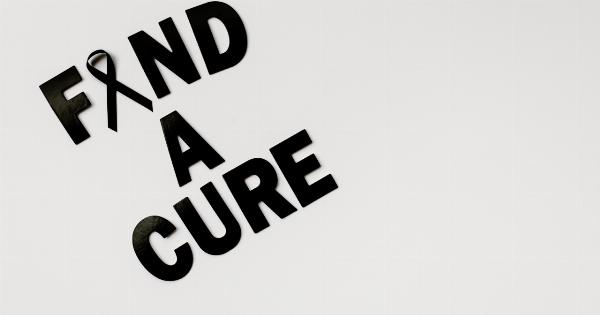Cancer is a life-threatening disease that affects millions of people worldwide. Both men and women are susceptible to various types of cancers, but there are certain cancers that predominantly affect men.
It is crucial for men to be aware of the symptoms associated with these cancers, as early detection can significantly improve the chances of successful treatment and survival. In this article, we will explore the common cancer symptoms that men should watch out for.
1. Prostate Cancer
Prostate cancer is one of the most common cancers in men, particularly affecting those over the age of 50. The symptoms of prostate cancer may include:.
- Blood in the urine or semen
- Frequent urination, especially at night
- Weakened urine flow or difficulty starting and stopping
- Pain or discomfort during ejaculation
- Persistent bone pain, especially in the back, hips, or pelvis
If you experience any of these symptoms, it is essential to consult a healthcare professional for a proper diagnosis and further evaluation.
2. Lung Cancer
Lung cancer is another significant cancer that affects men. It is often associated with smoking, although non-smokers can also develop this disease. Common symptoms of lung cancer in men may include:.
- Chronic cough that worsens over time
- Blood in cough or phlegm
- Shortness of breath
- Chest pain or discomfort
- Hoarseness
Early detection of lung cancer is crucial, as it often presents with advanced stages. If you experience any of these symptoms or have a history of smoking, it is recommended to seek medical attention promptly.
3. Colorectal Cancer
Colorectal cancer affects both men and women and occurs in the colon or rectum. It is the third most common cancer worldwide. Symptoms of colorectal cancer may include:.
- Changes in bowel habits, such as diarrhea or constipation
- Blood in the stool
- Abdominal discomfort or pain
- Unexplained weight loss
- Weakness or fatigue
Regular screening for colorectal cancer, such as colonoscopies, is recommended, especially for individuals above the age of 50. If you notice any of these symptoms, consult a healthcare professional for further evaluation.
4. Testicular Cancer
Testicular cancer is relatively rare but predominantly affects young men between the ages of 15 and 40. It is highly treatable, especially when detected early. Common symptoms of testicular cancer include:.
- A painless lump or swelling in one or both testicles
- Testicular pain or discomfort
- Heaviness or aching sensation in the lower abdomen or scrotum
- Fluid accumulation in the scrotum
If you experience any of these symptoms, it is crucial to consult a healthcare professional for prompt evaluation, as early detection leads to better treatment outcomes.
5. Skin Cancer
Skin cancer is the most common type of cancer globally, and men are more likely to develop it due to increased sun exposure and less frequent sunscreen use. Symptoms of skin cancer may include:.
- Changes in existing moles, such as size, shape, or color
- New growths or sores that don’t heal
- Itching, tenderness, or bleeding in a mole or other skin area
- Spots or patches that are red, scaly, or crusty
Regular self-examinations and routine dermatological screenings are crucial for early detection of skin cancer. If you notice any concerning changes on your skin, consult a dermatologist for further evaluation.
6. Liver Cancer
Liver cancer is more prevalent in men, particularly those with a history of liver disease or hepatitis B or C infection. Common symptoms of liver cancer may include:.
- Abdominal pain or tenderness
- Unexplained weight loss
- Swelling or fluid buildup in the abdomen
- Nausea or vomiting
- Fatigue or weakness
If you experience any of these symptoms or have risk factors for liver cancer, it is essential to consult a healthcare professional for further evaluation and appropriate management.
7. Bladder Cancer
Bladder cancer affects both men and women, but men tend to develop it more frequently. Common symptoms of bladder cancer may include:.
- Blood in the urine
- Frequent urination
- Painful or burning urination
- Lower back or abdominal pain
- Pelvic pain
If you notice any of these symptoms, especially blood in your urine, it is crucial to seek medical attention promptly for a proper diagnosis and timely treatment.
8. Pancreatic Cancer
Pancreatic cancer is relatively rare but has a low survival rate due to late diagnosis. Common symptoms of pancreatic cancer in men may include:.
- Abdominal or mid-back pain
- Unexplained weight loss
- Loss of appetite
- Jaundice (yellowing of the skin and eyes)
- Fatigue or weakness
If you experience any persistent symptoms, particularly concerning abdominal pain or unexplained weight loss, it is crucial to consult a healthcare professional for further evaluation.
9. Esophageal Cancer
Esophageal cancer affects the esophagus, the tube that connects the throat to the stomach. It is more common in men and often diagnosed at advanced stages. Symptoms of esophageal cancer may include:.
- Difficulty swallowing, especially solid food
- Unintended weight loss
- Chest pain or pressure
- Heartburn or acid reflux that doesn’t respond to medication
- Chronic cough or hoarseness
If you experience any of these symptoms, it is crucial to consult a healthcare professional for accurate diagnosis and prompt treatment.
10. Kidney Cancer
Kidney cancer affects both men and women, but men are more commonly diagnosed with this disease. Symptoms of kidney cancer may include:.
- Blood in the urine
- Lower back pain, on one side
- Unexplained weight loss
- Fatigue or weakness
- Swelling in the legs or ankles
If you experience persistent back pain or notice blood in your urine, consult a healthcare professional for further evaluation to rule out kidney cancer.
Conclusion:.
Early detection and recognition of cancer symptoms are crucial for the timely diagnosis and treatment of cancer.
It is essential for men to familiarize themselves with the signs and symptoms associated with various types of cancers that primarily affect them. Regular check-ups, self-examinations, and maintaining a healthy lifestyle can significantly contribute to early detection and better treatment outcomes.
If you notice any concerning symptoms or have an increased risk of developing cancer, consult a healthcare professional for proper evaluation and guidance.
























